- Home
- Mario Puzo
The Fourth K Page 8
The Fourth K Read online
Page 8
And so it had been.
So late on Easter Sunday night Attorney General Christian Klee left the White House to visit Oliver Oliphant, to ask his advice and also to inform him that his one-hundredth birthday party had been postponed by President Kennedy.
The Oracle lived on a fenced estate that was expensively guarded; its security system had bagged five enterprising burglars in the last year. His large staff of servants, well paid and well pensioned, included a barber, a valet, a cook and maids, for there were still many important men who came to the Oracle for advice and sometimes had to be fed elaborate dinners or provided with lodging.
Christian looked forward to his visit with the Oracle. He enjoyed the old man’s company, the stories he told of terrible wars on the battlefields of money, the strategies of men dealing with fathers, mothers, wives and lovers. He talked of how to defend against the government, its strength so prodigious, its justice so blind, its laws so treacherous, its free elections so corrupting. Not that the Oracle was a professional cynic, he was merely clear-sighted. And he insisted that one could lead a happy successful life while observing the ethical values on which true civilization endures. The Oracle could be dazzling.
The Oracle received Christian in his second-story suite of rooms, which consisted of a narrow bedroom, an enormous bathroom tiled blue that held a Jacuzzi and a shower with a marble bench and handholds sculpted into its walls. There was also a den with an impressive fireplace, a library and a cozy sitting room with a brightly colored sofa and armchairs.
The Oracle was in the sitting room resting in a specially built motorized wheelchair. Beside him was a table, and facing him were an armchair and a table set for an English tea.
Christian took his place in the armchair opposite the Oracle and helped himself to tea and one of the little sandwiches. As always, Christian was delighted by the appearance of the Oracle, the intensity of the man’s gaze so remarkable in one who had lived for a hundred years. And it seemed logical to Christian that the Oracle had evolved from a homely sixty-five-year-old to a striking ancientness. The skin was shell-like, as was his bald pate, which showed liver spots dark as nicotine. Leopard-skin hands protruded from his exquisitely cut suit—extreme age had not vanquished his sartorial vanity. The neck, encircled loosely by a silk tie, was scaly and ridged; the back broad, curved like glass. The front of the body fell away to a tiny chest; you could encircle his waist with your fingers, and his legs were hardly more than two strands in a spider’s web. But the facial features were not yet ravaged by approaching death.
Christian poured the Oracle his cup, and for the first few minutes they smiled at each other, drinking tea.
The Oracle spoke first. “You’ve come to cancel my birthday party, I assume. I’ve been watching the TV with my secretaries. I told them the party would be postponed.” His voice had the low growl of a worn larynx.
“Yes,” Christian said. “But only for a month. Think you can hold out that long?” He was smiling.
“I sure do,” the Oracle said. “That shit is on every TV station. Take my advice, my boy, buy stock in the TV companies. They will make a fortune out of this tragedy and all the forthcoming tragedies. They are the crocodiles of our society.” He paused for a moment and said more softly, “How is your beloved President taking all this?”
“I admire that man more than ever,” Christian said. “I have never seen someone in his position more composed over a dreadful tragedy. He is much stronger now than after his wife died.”
The Oracle said dryly, “When the worst that can happen to you actually happens, and you bear it, then you are the strongest of men in the world. Which, actually, may not be a very good thing.”
He paused for a moment to sip his tea, his colorless lips closed into a pale white line like a scratch on the seamed nicotine-spotted skin of his face. Then he said, “If you feel it’s not breaking your oath of office or your loyalty to the President, why don’t you tell me what action is being taken.”
Christian knew that this was what the old man lived for. To be inside the skin of power. “Francis is very concerned that the hijackers have not yet made any demands. It’s been ten hours,” Christian said. “He thinks that’s sinister.”
“So it is,” the Oracle said.
They were both silent for a long time. The Oracle’s eyes had lost their vibrancy, and seemed extinguished by the pouches of dying skin beneath them.
Christian said, “I’m really worried about Francis. He can’t take much more. If something happens to her …”
The Oracle said, “There will be a very dangerous confrontation. You know, I remember Francis Kennedy as a little boy. Even then I was struck by how he dominated his cousins. He was a natural hero, even as a young boy. He defended the smaller ones, he made peace. And sometimes he did more damage than any of the bullies would have done. Black eyes darkened in the name of virtue.”
The Oracle paused and Christian poured him some hot tea though the cup was still more than half full. He knew the old man could not taste anything unless it was very hot or very cold.
Christian said, “Whatever the President tells me to do, I’ll do it.”
The Oracle’s eyes were suddenly very bright and visible. He said musingly, “You’ve become a very dangerous man in these past years, Christian. But not terribly original. All through history there have been men, some considered ‘great,’ who have had to choose between God and country. And some very religious men have chosen country over God, believing they would go to everlasting hell, thinking it noble. But, Christian, we have come to a time when we must decide whether to give our lives to our country or to help mankind continue to exist. We live in a nuclear age. That is the new and interesting question, a question never before posed to individual men. Think in those terms. If you side with your President, do you endanger mankind? It’s not so simple as rejecting God.”
“It doesn’t matter,” Christian said. “I know Francis is better than Congress, the Socrates Club and the terrorists.”
The Oracle said, “I’ve always wondered about your overwhelming loyalty to Francis Kennedy. There are some vulgar gossips who say it’s a very faggy business. On your part. Not his. Which is odd, since you have women and he does not, not since the death of his wife three years ago. But why do the people around Kennedy hold him in such veneration, when he’s recognized as a political dunderhead? All those reformist and regulatory laws he tried to shove down that dinosaur Congress’s throat. I thought that you were smarter than that, but I presume you were overruled. Still, your inordinate affection for Kennedy is a mystery to me.”
“He’s the man I always wished I could be,” Christian said. “It’s as simple as that.”
“Then you and I would not have been such longtime friends,” the Oracle said. “I never cared for Francis Kennedy.”
“He’s just better than anybody else,” Christian said. “I’ve known him for over twenty years, and he’s the only politician who has been honest with the public, he doesn’t lie to them.”
The Oracle said dryly, “The man you described could never be elected President of the United States.” He seemed to puff out his insect body, his shiny-skinned hands tapped the controls of his wheelchair. The Oracle leaned back. Above the dark suit, the ivory shirt and simple blue streak of his tie, the glazed face looked like a piece of mahogany. He said, “His charm escapes me, but we never got on. Now I must warn you. Every man in his lifetime makes many mistakes. That is human, and unavoidable. The trick is never to make the mistake that destroys you. Beware of your friend Kennedy, who is so virtuous, remember that evil can spring from the desire to do good. Be careful.”
“Character doesn’t change,” Christian said confidently.
The Oracle fluttered his arms like bird wings. “Yes, it does,” he said. “Pain changes character. Sorrow changes character. Love and money, certainly. And time erodes character. Let me tell you a little story. When I was a man of fifty, I had a mistress thirty years younger t
han myself. She had a brother who was ten years older than she, about thirty. I was her mentor, as I was with all my young women. I had their interests at heart. Her brother was a Wall Street hotshot and a careless man, which later got him into big trouble. Now, I was never jealous—she went out with young men. But on her twenty-first birthday, her brother gave a party and as a joke hired a male stripper to perform before her and her friends. It was all above board, they made no secret of it. But I was always conscious of my homeliness, my lack of physical appeal to women. And so I was affronted, and that was unworthy of me. We all remained friends and she went on to marriage and a career. I went on to younger mistresses. Ten years later her brother gets into financial trouble, as many of those Wall Street types do. Inside tips, finagling with money entrusted to him. Very serious trouble that landed him a couple of years in prison and of course the end of his career.
“By this time I was sixty years old, still friends with both of them. They never asked for my help, they really didn’t know the extent of what I could do. I could have saved him but I never lifted a finger. I let him go down the drain. And ten years later it came to me that I didn’t help him because of that foolish little trick of his, letting his sister see the body of a man so much younger than myself. And it wasn’t sexual jealousy, it was the affront to my power, or the power I thought I had. I’ve thought of that often. It is one of the few things in my life that shame me. I would never have been guilty of such an act at thirty or at seventy. Why at sixty? Character does change. That is man’s triumph and his tragedy.”
Christian switched to the brandy that the Oracle had provided. It was delicious and very expensive. The Oracle always served the very best. Christian enjoyed it, though he would never buy it; born rich, he never felt he deserved to treat himself so well. He said, “I’ve known you all my life, over forty-five years, and you haven’t changed. You are going to be a hundred next week. And you’re still the great man I always thought you were.”
The Oracle shook his head. “You know me only in my old age, from sixty to a hundred. That means nothing. The venom is gone then and the strength to enforce it. It’s no trick to be virtuous in old age, as that humbug Tolstoy knew.” He paused and sighed. “Now, how about this great birthday party of mine? Your friend Kennedy never really liked me and I know you pushed the idea of the White House Rose Garden and a big media event. Is he using this crisis situation to get out of it?”
Christian said, “No, no, he values your life’s work, he wants to do it. Oliver, you were and are a great man. Just hang on. Hell, what’s a few months after a hundred years?” He paused. “But if you prefer, since you don’t like Francis, we can forget about his big plans for your birthday party, mass coverage by the media, your name and picture in all the papers and on TV. I can always throw you a little private party right away and get the whole thing over with.” He smiled at the Oracle to show that he was joking. Sometimes the old man took him too literally.
“Thank you, but no,” the Oracle said. “I want to have something to live for. Namely, a birthday party given by the President of the United States. But let me tell you, your Kennedy is shrewd. He knows my name still means something. The publicity will enhance his image. Your Francis Xavier Kennedy is as crafty as was his uncle Jack. Now, Bobby would have shown me the back of his hand.”
Christian said, “None of your contemporaries are left, but your protégés are some of the great men and women in the country, and they look forward to doing you this honor. Including the President. He doesn’t forget that you helped him on his way. He’s even inviting your buddies in the Socrates Club and he hates them. It will be your best birthday party.”
“And my last,” the Oracle said. “I’m hanging on by my fucking fingernails.”
Christian laughed. The Oracle had never used bad language until he was ninety, so now he used it as innocently as a child.
“That’s settled,” the Oracle said. “Now let me tell you something about great men, Kennedy and myself included. They finally consume themselves and the people around them. Not that I concede your Kennedy is a great man. So he’s become President of the United States. But that is an illusionist’s trick. Do you know, by the way, that in show business the magician is considered to be completely without artistic talent?” Here the Oracle cocked his head; he astonishingly resembled an owl.
“I will concede that Kennedy is not your typical politician,” the Oracle said. “He is an idealist, he is far more intelligent and he has morals, though I wonder whether sexual rigidity is healthy. But all these virtues are a handicap to political greatness. A man without a vice? A sailing ship without a sail!”
Christian asked, “You disapprove of his actions. What course would you take?”
“That is not relevant,” the Oracle said. “His whole three years, he’s got his dick half in, half out, and that’s always trouble.” Now the Oracle’s eyes became cloudy. “I hope it doesn’t interfere with my birthday party too long. What a life I had, eh? Who had a better life than I? Poor at birth, so that I could appreciate the wealth I earned later. A homely man who learned to captivate and enjoy beautiful women. A good brain, a learned compassion so much better than the genetic kind. Enormous energy, enough to power me past old age. A good constitution, I’ve never been really sick in my life. A great life, and long! And that’s the trouble, maybe a little too long. I can’t bear to look at myself in the mirror now, but as I said, I was never handsome.” He paused for a time and then said abruptly to Christian, “Leave government service. Dissociate yourself from everything that is happening now.”
“I can’t do that,” Christian said. “It’s too late.” He studied the old man’s freckled head and marveled at the brain that was still so alive. Christian stared into those aged eyes shrouded like a never-ending misty sea. Would he ever be so old, with his body shriveling like some dead insect?
And the Oracle watching him thought, How transparent they all are, as guileless as little children. It was obvious to the Oracle that his advice had been given too late, that Christian would commit a treachery to himself.
Christian finished his brandy and rose to leave. He tucked the blankets around the old man and rang for the nurses to come into the room. Then he whispered into the glazed skin of the Oracle’s ear. “Tell me the truth about Helen Du Pray, she was one of your protégées before she got married. I know you arranged for her first entry into politics. Did you ever screw her, or were you too old?”
The Oracle shook his head. “I was never too old until after ninety. And let me tell you that when your cock leaves you, that is real loneliness. But to answer your question. She didn’t fancy me, I was no beauty. I must say I was disappointed, she was very beautiful and very intelligent, my favorite combination. I could never love intelligent homely women—they were too much like myself. I could love beautiful dumb women, but when they were intelligent, then I was in heaven. Helen Du Pray—ah, I knew she would go far, she was very strong, a strong will. Yes I tried but never succeeded, a rare failure I must say. But we always remained good friends. That was a talent she had, to refuse a man sexually and yet be an intimate friend. Very rare. That was when I knew she was a seriously ambitious woman.”
Christian touched his hand, it felt like a scar. “I’ll phone or drop in to see you every day,” he said. “I’ll keep you up to date.”
The Oracle was very busy after Christian left. He had to pass on the information Klee had given him to the Socrates Club, whose members were important figures in the structure of America. He did not consider this a betrayal of Christian, whom he dearly loved. Love was always secondary.
He had to take action, his country was sailing in dangerous waters. It was his duty to help guide it to safety. And what else could a man his age do to make life worth living? And to tell the truth he had always despised the Kennedy legend. Here was a chance to destroy it forever.
Finally the Oracle let the nurse fuss over him and prepare his bed. He remembered Helen Du Pray w
ith affection, and now without disappointment. She had been very young, in her early twenties, her beauty enhanced by a tremendous vitality. He had often lectured her on power, its acquisition and uses, and, more important, on abstaining from its use. And she had listened with the patience that is necessary to acquire power.
He told her that one of the great mysteries of mankind was how people acted against their own self-interest. Points of pride ruined their lives. Envy and self-delusion took them down paths that led to nothingness. Why was it so important for people to maintain a self-image? There were those who would never truckle, never flatter, never lie, never back down, never betray or never deceive. There were those who lived in envy and jealousy of the happier fate of others.
It had all been a special sort of pleading and she had seen through it. She rejected him and went on, without his help, to achieve her own dream of power.
One of the problems of having a mind as clear as a bell when you are a hundred years old is that you can see the hatching of unconscious villainy in yourself, and ferret it out in past history. He had been mortified when Helen Du Pray had refused to make love with him. He knew she had other lovers, she was not prissy. But at seventy he, amazingly, had still been vain.

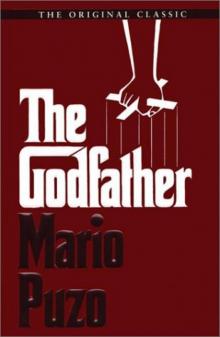 The Godfather
The Godfather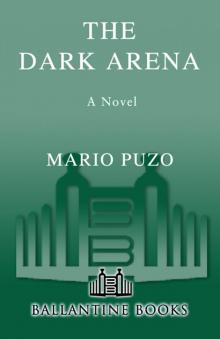 The Dark Arena
The Dark Arena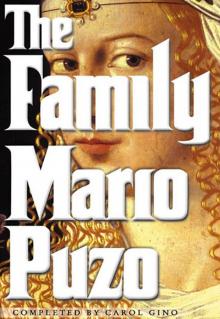 The Family
The Family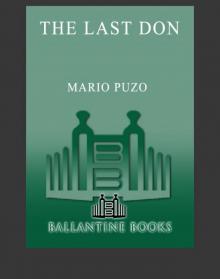 Last Don
Last Don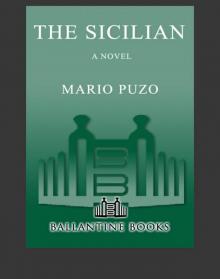 The Sicilian
The Sicilian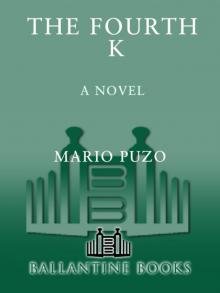 The Fourth K
The Fourth K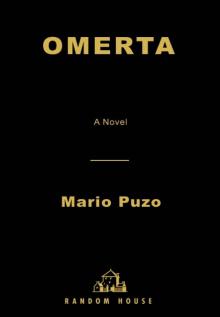 Omerta
Omerta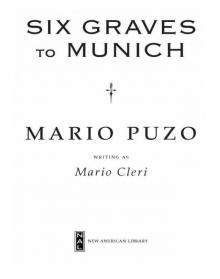 Six Graves to Munich
Six Graves to Munich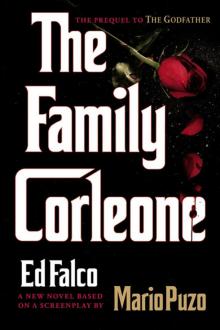 The Family Corleone
The Family Corleone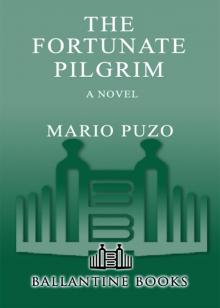 The Fortunate Pilgrim
The Fortunate Pilgrim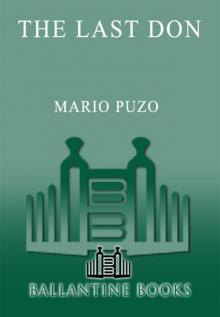 The Last Don
The Last Don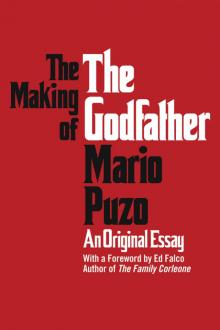 The Making of the Godfather
The Making of the Godfather Fools die
Fools die The Sicilian (v2.0)
The Sicilian (v2.0)